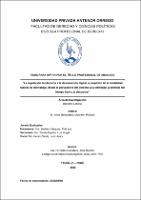| dc.contributor.advisor | Ferradas Caballero, José Ramiro | |
| dc.contributor.author | Ulloa Benavides, Meryann Michael | |
| dc.creator | Ulloa Benavides, Meryann Michael | |
| dc.date.accessioned | 2022-08-03T02:18:53Z | |
| dc.date.available | 2022-08-03T02:18:53Z | |
| dc.date.issued | 2022 | |
| dc.identifier.uri | https://hdl.handle.net/20.500.12759/9238 | |
| dc.description.abstract | El propósito de este trabajo de investigación se focalizó en analizar los efectos del
encuadre jurídico del derecho a la desconexión laboral en el Perú, con motivo del
auge de la aplicación del teletrabajo como modalidad laboral, desde la óptica del
derecho a la intimidad, al descanso y al goce del tiempo libre. Por otro lado, la
metodología empleada fue de nivel descriptiva y del tipo básica; el diseño de
contrastación fue explicativo-descriptivo; la muestra estuvo conformada por cinco
jueces laborales de la Corte Superior de Justicia de La Libertad y por jurisprudencia,
doctrina, proyectos de ley, sentencias, normas y expedientes en Derecho Laboral y
Derecho Constitucional, que se centraron, específicamente, en el derecho a la
desconexión digital, teletrabajo, así como en el derecho a la intimidad, al descanso
y al goce del tiempo libre. La guía de entrevista y la de análisis documental fueron
los instrumentos utilizados en la presente investigación. Es entonces que, de este
modo, se llegó a comprobar que los resultados de la regulación del derecho a la
desconexión laboral, a propósito de la modalidad del teletrabajo, desde el enfoque
del derecho a la intimidad, al descanso y al goce del tiempo libre, están íntimamente
relacionados con la difusión de la utilización de las Tecnologías de la Información y
la Comunicación (TIC), lo que precisa la existencia de un instrumento que controle
y, de cierta forma, restrinja el control empresarial; y que a su vez, garantice el
respeto de la vida personal y familiar del trabajador y, principalmente, que imponga
penalidades para aquel empleador que trasgreda los límites de la relación laboral.
Así, se comprueba la hipótesis de investigación, y se sustenta con los resultados de
las entrevistas, en donde se define que los efectos de determinar una regulación
propia sobre el derecho a la desconexión digital dentro del ordenamiento jurídico
peruano, controla el tan fomentado uso de las TIC, sirve como garantía del respeto
a la vida familiar y personal del trabajador, así como límites y penalidades
imputables a aquellos empleadores que pretendan servirse de la modalidad laboral
en referencia para aventajar los límites de la relación que lo conecta con el
trabajador, vulnerando, en consecuencia, la norma especial en estudio. | es_PE |
| dc.description.abstract | The objective of this research was to analyze what are the effects of the regulation
of the right to digital disconnection, regarding the working modality of telework, from
the perspective of the right to privacy, the enjoyment of free time and rest. On the
other hand, the methodology used was of a basic type and descriptive level, the
contrast design was descriptive-explanatory; the sample was made up of 5 labor
judges of the Superior Court of Justice of La Libertad and by doctrine, case law, bills,
rulings, rules and files on Labor Law and Constitutional Law specifically on the right
to digital disconnection, teleworking, as well as the right to privacy, the enjoyment of
leisure time and rest. The instruments applied were the interview guide and the
document analysis guide. It was found that the effects of the regulation of the right
to digital disconnection, with regard to the mode of work of teleworking, from the
perspective of the right to privacy, to the enjoyment of free time and to rest, are
expressed in the limitation of the use of Information and Communication
Technologies (ICT), restriction of business control, respect for the personal and
family life of the worker, and mainly in the imposition of sanctions on the employer.
In this way, the research hypothesis is checked and based on the results of the
interviews, in which it is determined that the effects of establishing a special
regulation on the right to digital disconnection within the legal system make it
possible to limit the use of TICs, grant greater respect to the personal and family life
of the worker, and to lay down the limits and penalties applicable to employers who
violate that special rule. | en_US |
| dc.description.uri | Tesis | es_PE |
| dc.format | application/pdf | es_PE |
| dc.language.iso | spa | es_PE |
| dc.publisher | Universidad Privada Antenor Orrego | es_PE |
| dc.relation.ispartofseries | T_DERE_566 | |
| dc.rights | info:eu-repo/semantics/closedAccess | es_PE |
| dc.rights.uri | https://creativecommons.org/licenses/by/4.0/ | es_PE |
| dc.source | Universidad Privada Antenor Orrego | es_PE |
| dc.source | Repositorio Institucional - UPAO | es_PE |
| dc.subject | Derecho a la Desconexión Digital | es_PE |
| dc.subject | Derecho al Goce del Descanso y al Tiempo Libre | es_PE |
| dc.title | La regulación del derecho a la desconexión digital, a propósito de la modalidad laboral de teletrabajo, desde la perspectiva del derecho a la intimidad, al disfrute del tiempo libre y al descanso | es_PE |
| dc.type | info:eu-repo/semantics/bachelorThesis | es_PE |
| thesis.degree.level | Título Profesional | es_PE |
| thesis.degree.grantor | Universidad Privada Antenor Orrego. Facultad de Derecho y Ciencias Politicas | es_PE |
| thesis.degree.name | Abogado | es_PE |
| thesis.degree.discipline | Derecho | es_PE |
| dc.subject.ocde | https://purl.org/pe-repo/ocde/ford#5.05.00 | es_PE |
| renati.advisor.orcid | https://orcid.org/0000-0002-3357-7637 | es_PE |
| renati.author.dni | 70854678 | |
| renati.advisor.dni | 17847575 | |
| renati.type | https://purl.org/pe-repo/renati/type#tesis | es_PE |
| renati.level | https://purl.org/pe-repo/renati/level#tituloProfesional | es_PE |
| renati.discipline | 421016 | es_PE |
| renati.juror | Benites Vásquez, Tula Luz | |
| renati.juror | Zavala Espino, Luis Angel | |
| renati.juror | Heras Zárate, Luis Henry | |
| dc.publisher.country | PE | es_PE |


